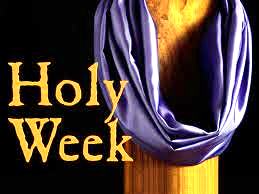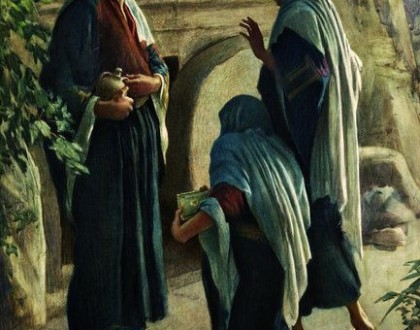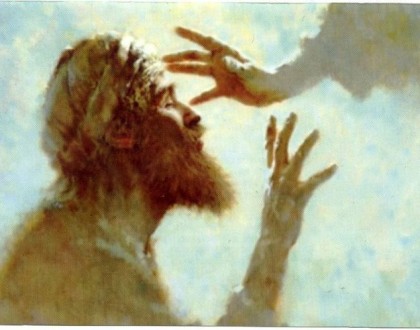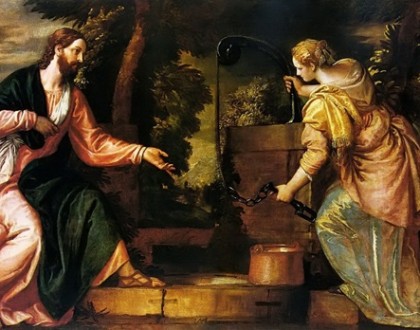Holy Week 2015

Holy Week 2015
Here we are once again in Holy Week. The summit of the liturgical year. A week where we are invited to follow step by step the passion, death and resurrection of Jesus. The readings all this week plunge us into these final hours of Jesus’s life. A well-known theologian once said that “The Gospels are Passion narratives with long introductions”. Everything in the 4 gospels is leading to this moment.
The passion narratives are long and intense, but I would like to take just a few points of meditation to help us enter deeper into this incredible event.
This event is simultaneously the worst moment in history, we crucified the one who came to save us, and the best moment in history, because at the moment all seemed lost, all was won. At the darkest hour the greatest light has shone. The weakest moment in the life of Jesus is the moment the power of God’s love is victorious over death and sin. It’s the paradox of God’s love, of His ways. What is that telling us? God’s power and love is constantly revealed to us through times of loss, darkness, weakness. The power of the cross is a power of transformation, that if we allow it to touch our lives it will transform it.
The word “passion” is often misunderstood. We think immediately of sufferings, deep emotion, deep love. Actually it comes from the latin word “Passio”, the word for passiveness. Most of Jesus’s life He was “Active”; teaching, healing, doing miracles etc. The last 48 hours he is totally “Passive”. Jesus spent His whole life taking initiatives, doing things, but from the moment he gets up off the ground in the Garden of Gethsemane, things are done to Him.
A friend of mine who died a few years ago was a very active man, always doing, helping others, creating job opportunities for others, providing for his family. The last 9 months of his life he couldn’t wash, feed, provide for himself. He was totally dependent on others. The man, who was always totally in control, totally lost all control. Became like a little tiny baby, helpless. Why does God allow these things? It’s a question we all struggle with. I got an answer to this question from a member of his family just after he died. She said “all his life he did things for us, provided, cared, worked, organized…but in the last 9 months of his life, when he could “do nothing”, we received more from him than all the other 56 years of his life”. He gave his life for others and that’s beautiful but giving your death for others is the greatest gift you can give anybody. To die at peace with God, with others, in forgiveness, not bitter but grateful for the gift of life and living in communion with the passion of Christ is the greatest gift of all.
When Jesus died, blood and water flowed. Water is the symbolism of cleansing. Blood is the symbol of life. Sometimes I get to do a wedding and a funeral the same day. Often weddings for me, strangely enough, can be a little depressing. I mean I`m happy for the couple and all that… but often it’s all about “how do I look”; who has the best dress… the atmosphere can be very superficial and shallow. The funeral of a person who has lived a full life, joyful, God loving, generous on the other hand leaves me wanting to live life to the full, its life giving.
The vulnerability of Jesus during his passion is one of the most incredible images of Holy Week. The words of Jesus to his disciples, during his agony, when he found them sleeping; “Could you not wait one hour with me?” (Matthew 26:40) echo powerfully within us. In the well known film “The Passion of Christ” from Mel Gibson, there is a moment during the agony in the garden of Gethsemane when a strange and dark personage (Satan) is seen to question Jesus “Who is your Father?”. It’s an identity question; Who are you? What makes you who you are? Where do you get your strength from? Who’s telling you who you are? Holy Week if we live it not as a spectator but as a participant, we will discover our true identity, who we really are, who we are in God. Simon of Cyrene discovered who he was simply by shouldering the cross with Jesus. Embracing this cross. We all have crosses but very few of us “embrace” our crosses. When we do they become lighter because we discover they are already being carried.
Jesus is a “Stone’s throw away” from his disciples as he suffers his agony, he is alone. Far from the cheering crowds, with tough decisions. Here we touch his loneliness. We all know these moments where no human can really understand our suffering, its between us and God. We make tough moral decisions not because it feels good, or makes us popular but because we know its right.
The disciples fall asleep while Jesus is suffering his agony. They could be excused, its almost mid-night, they’ve just had at least 4 cups of wine, a big Jewish Passover meal… but interestingly enough it’s not that that makes them sleep, the gospel tells us its sadness, a certain form of depression. Sadness blinds us to God, his grace, his compassion, his vulnerability, his love.
Peter, who a few hours earlier said he would be ready to go to prison and even die (Luke 22:33), has run like a coward. He was told by Jesus he would deny him 3 times before the cock crows. In Luke’s gospel, just after he denies he even knows Jesus for the 3rd time he hears the cock-crow. There is then this extraordinary scene when Peter meets the gaze of Jesus (Luke 22:61). Not a good time to get a look! But Peter experiences something in this flash of an instant that sums up the whole of Holy Week, in fact the whole of our Christian existence… It wasn’t a gaze of anger, it was a gaze of unconditional love. A love we rarely experience this side of heaven. Peter’s heart melts like butter on a piece of hot toast. “He went outside and wept bitterly” (Luke 22:62). This is a turning point for Peter. What makes Peter great, ready to be our 1st leader and Pope? It’s not his leadership skills or human qualities. It’s the fact he accepted to be forgiven, he surrendered to God’s unconditional love. The greatest thing we will ever do is to accept to be forgiven.
One final point, there is a strange little line in the passage we read in the Passion narrative in Saint Matthew’s gospel (27:51). At the moment Jesus dies on the cross, “behold, the curtain of the temple was torn in two, from top to bottom”. What does this mean?
When ripped away, ordinary people could see into the Holy of Holies. It’s the veil that separates us from looking into God, the heart of God.
The curtain veil was what separated the ordinary people from the “Holy of Holies”, the center of the temple. When ripped away, ordinary people could see into the Holy of Holies. It’s the veil that separates us from looking into God, the heart of God. What’s happening at the cross is that the hidden God is being revealed for what he truly is, and what a beautiful sight it is. Like a rainbow, refracted light is cracked open to unveil the spectacular inside of light so to speak. What we see is a God of pure, unconditional, compassionate and self-giving love. Banished are all the images of a fearful, fierce, angry, vengeful and petty God. What heart cannot melt when faced with such a vision, such an image of a totally accessible and vulnerable God?
Take time to gaze upon the cross this week. We are called to embrace that cross, his sufferings, why? This is because he embraced ours. Our sufferings have become His, our trials have become His, our loneliness has become His, our pain has become His, our darkest hours are His. When we are compassionate towards others it’s always very limited, the other will always be “other”. But Jesus’s compassion (passio; suffer, com; with) is substantial because He is God, really our pain has truly become His.
We worship a wounded man, no other religion does that. We shouldn’t be afraid or ashamed to be our “wounded” selves in His presence and so be united with Him on his path from Gethsemane to the cross. It’s the only path through this broken world we live in.
Recent Sermons

Easter Sunday – The Resurrection
April 14, 2017

4th Sunday of Lent Year A – The Man Born Blind
March 27, 2017

3rd Sunday of Lent Year A – The Samaritan Woman at the Well
March 20, 2017



